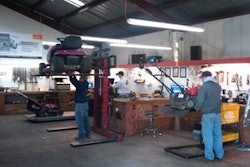Your business was running smoothly as sales and profits grew. Then the credit crunch hit and everything started slowing down almost overnight.
The Danger of Depending on Credit
Most dealers don’t realize how dependent they are on credit to run their businesses. When collections roll in on time, it all seems to work out nicely. But when collection slows down, you still need to pay for and replace equipment and parts sold, pay your workers, and pay the rent and all the other general expenses of running a dealership.
Assuming your bank credit lines are in place and your margins are adequate, you can have a bit higher interest expense, and still ride it out with your customers. However, if your credit lines or cash reserves aren’t sufficient to cushion you from the sudden change in cash flow, your business could be in big trouble. Most bad debt write-offs come from old balances, not current ones. The older the balance, the higher risk it will never be collected.
The best way to protect your business is to encourage your customers to pay on time. Here are five ideas to encourage them to do just that.
1. Improved Credit-Granting
Begin by screening new customers more closely before granting a credit line. Spending a few extra dollars to get a credit report, and a few minutes calling a couple credit references, can go a long way. Listen for information about their payment patterns and red flags about struggling to keep current.
2. Commit to Collection at All Times
Make collection follow-up a key duty of at least one person on your staff. Assign the job to someone who is a good negotiator, has an amiable but firm phone personality, and who understands this is a key job. Most importantly, do what you say. If you promise something in return for prompt payment, make sure you deliver. If your collection practices have been lax in the past, a culture change may be needed in the minds of your customers, who may be tempted to “wait you out” to see how long the new rules will stick around.
3. Call Ahead to be Sure They’re Ready to Pay
Have your collection person call the customer a few days before the due date for payment, “as a courtesy” to your customer. Make sure everything is in order, there were no problems with the paperwork, and the check will be going out on time. This little reminder, when positioned with friendliness and desire to help, can make a friend of the person who actually cuts the check.
4. Discounts for Prompt Payment
Consider offering customers a discount when they make payments in a timely manner. You can discount it in any way that makes sense as a dealer, but the key is getting the customer to understand the value they get from paying promptly. Many municipal accounts are required by their policies to take advantage of such discounts.
5. Develop a Preferred Customer Plan
Consider a special program for “special” customers: free overnight delivery on rush parts orders, extra discounts, advance notice of price changes, special sales, etc. Promote this as a customer benefit and make it available only under certain conditions, one of which would be consistent payment in accordance with your terms.
Don’t make sheer order volume a condition if your low-volume consumer customers produce higher margins, as is often the case. A small invoice that is paid on time is a blessing compared to a large one that takes 90 days to come in.
Make the conditions list beefy enough that it doesn’t look like a poorly disguised collection program. Use it as an opportunity to reward the customers you enjoy doing business with, especially those who pay on time every time.
You can appreciate your customers’ dilemma in trying to stretch their cash. However, that’s not the same as agreeing to be their interest-free banker. You can extend their payment terms, as many companies do at times like these, but in the end you still need to collect your money by a date you can count on.
Follow the suggestions here and you can be a better-positioned company when the economy turns around again.
Gene Siciliano (CMC, CPA) is an author, speaker and financial consultant who works with CEOs and managers to achieve greater financial success in an ever-changing economy. Gene’s book, “Finance for Non-Financial Managers,” (McGraw-Hill, 2003) is available nationwide in bookstores and online. To learn more, visit www.GeneSiciliano.com.



















